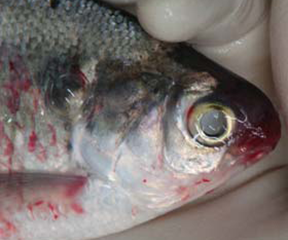By Joseph Carin
 [1]
[1]A shad shows signs of viral hemorrhagic septicemia. Photo courtesy of http://en.wikipedia.org/wiki/Viral_hemorrhagic_septicemia
Despite the threat of deadly disease killing fish in the Bay of Quinte local fishing charters to the Prince Edward-Hastings County continue to thrive, say operators.
Viral hemorrhagic septicemia or VHS is a common affliction for 16 types of fish found in an area stretching from waters stretching from Belleville to Prince Edward County. It causes bloating and bleeding from eyes and gills, along with inflammation of the abdomen, according to Ontario’s Ministry of Natural Resources and Forest. This year it is mainly killing off Freshwater Drum fish, a lesser known fish in the region not sought after by many anglers say local charter operators.
While it is impacting the fish stocks, operators say the impact is minimal on their businesses.
Bay of Quinte Charters owner and Captain Scott Walcott provided first-hand experience on this season’s death toll.
“I’ve noticed the increase in the die-off this year but I’ve only seen Freshwater Drum affected by VHS,” said Walcott.
Few anglers chase after fresh water drum due to their acquired taste. Ontario Ministry of Natural Resources Fish and Wildlife branch reports this years’ die-off only consist of Freshwater Drum resulting in no loss of population for the fish who are targeted during the open season, popular fish such as bass, pike or walleye.
“I have more business than I can handle now compared to back in 2005,” said Walcott who’s charter, like most in the Bay of Quinte area specializes in walleye and salmon.
Kevin Lavers, co-owner of Merland Park, also said he has not been affected by the rise in die-off this year for his fishing expeditions never entail Freshwater Drum.
“We have people catch Freshwater Drum by accident all the time, but always release them back because it is not the type of fish they are after,” said Lavers.
Lead management biologist Colin Lake received confirmation the fish samples sent in by locals of Prince Edward County have come back as positive for VHS.
“Tests can take up to months to finish. Our results from the testing of the dead fish samples reported in were confirmed as positive [three] days ago,” said Lake.
Lake continued to say VHS is a pathogen carried by fish and not all die from it. It is a combination of multiple factors such as the change in water temperature or the stress caused by reproduction alongside the virus.
“Given the winter season that happened this year, all signs were pointing towards VHS,” said Lake.
In 2005, the estimated total amount of dead fish where in the thousands; whereas this year it was in the low hundreds, Lake said. He did not have exact figures. The reports that had been coming since May 9th have stopped for the last two weeks according to Lake. Lake as well made note that a number of die-off reports were often repeated by mistake.
“A number of dead fish were reported multiple times which skewed the numbers, but in total this year we have gotten around a dozen reports since May 9th. We’ve actually stopped receiving reports as of two weeks ago so fingers crossed,” said Lake.